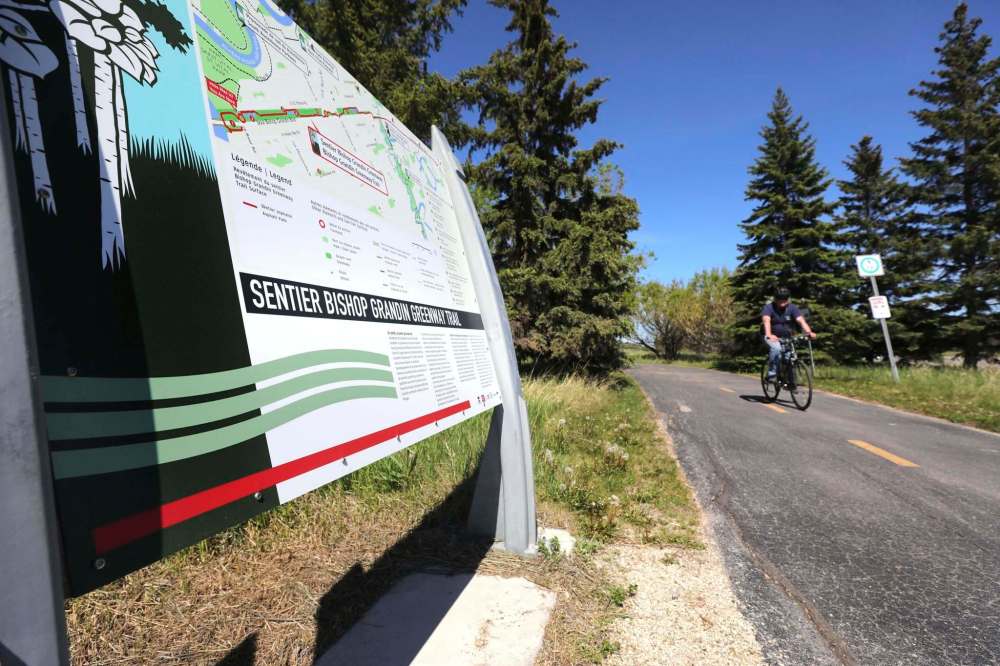Boulevard, greenway could be renamed by end of year
Advertisement
Read this article for free:
or
Already have an account? Log in here »
To continue reading, please subscribe:
Monthly Digital Subscription
$0 for the first 4 weeks*
- Enjoy unlimited reading on winnipegfreepress.com
- Read the E-Edition, our digital replica newspaper
- Access News Break, our award-winning app
- Play interactive puzzles
*No charge for 4 weeks then price increases to the regular rate of $19.00 plus GST every four weeks. Offer available to new and qualified returning subscribers only. Cancel any time.
Monthly Digital Subscription
$4.75/week*
- Enjoy unlimited reading on winnipegfreepress.com
- Read the E-Edition, our digital replica newspaper
- Access News Break, our award-winning app
- Play interactive puzzles
*Billed as $19 plus GST every four weeks. Cancel any time.
To continue reading, please subscribe:
Add Free Press access to your Brandon Sun subscription for only an additional
$1 for the first 4 weeks*
*Your next subscription payment will increase by $1.00 and you will be charged $16.99 plus GST for four weeks. After four weeks, your payment will increase to $23.99 plus GST every four weeks.
Read unlimited articles for free today:
or
Already have an account? Log in here »
Hey there, time traveller!
This article was published 22/08/2021 (1570 days ago), so information in it may no longer be current.
Bishop Grandin Boulevard and the greenway that runs parallel to it — both of which are named after an architect of the residential school system — could have new titles before the end of the year.
The volunteer board that oversees the greenway’s operations issued a notice this week to inform community members of its ongoing support for the City of Winnipeg’s efforts to explore cutting ties with Bishop Vital-Justin Grandin (1829-1902) as a namesake for local landmarks.
The board indicated renaming consultations are underway and it anticipates a report with a recommendation on the subject will be brought forward to city council this fall.

“I don’t want people to think we’re sitting on our hands and letting this fall by the wayside,” said Derick Young, president of Bishop Grandin Greenway Inc.
“There is a great deal of concern among some people in the community about the name and I think most people, not just in St. Vital, recognize that we need to deal with, as a country, our history of the residential schools and the legacy of people who were involved.”
The Truth and Reconciliation Commission concluded that Grandin, a Roman Catholic priest, “led the campaign for residential schooling.”
The commission’s final report outlines in detail Grandin’s idea to create boarding schools that would convert Indigenous children into Christians and his success in securing federal funding to make his pitch a reality.
The bishop once wrote, “To become civilized they should be taken with the consent of their parents and made to lead a life different from their parents and cause them to forget the customs, habits and language of their ancestors.”
Not long after the remains of 215 children were found in unmarked graves near a residential school site in Kamloops, outrage about the senseless death, abuse and intergenerational trauma caused by Grandin’s beliefs prompted demands to rename local landmarks.
First Nations leaders and concerned citizens have spoken out in favour of removing his name from the boulevard and greenway in south Winnipeg.
Others, however, want to leave the existing signage up and add markers that acknowledge his role in setting up the assimilative school system.
A Probe Research poll conducted in the spring found 55 per cent of Winnipeggers are in favour of renaming the boulevard because of Grandin’s role in the residential school system.
The survey, which took place June 2-11 with a random and representative sampling size of 600 adults, found 28 per cent of respondents were in favour of keeping the road’s name and educating the public on Grandin.
A total of 17 per cent of those surveyed indicated they wanted to keep the name as is.
Young said it’s likely new names will be chosen in the coming weeks — an announcement he expects will be met with enthusiasm by road and path users; the greenway, which includes community gardens and trails, is accessed by hundreds of people daily in the summer.
Once names are approved, there will be discussions about costs related to the logistics of renaming, including updating the title of the greenway board and installing new trailhead signs.
maggie.macintosh@freepress.mb.ca
Twitter: @macintoshmaggie

Maggie Macintosh reports on education for the Winnipeg Free Press. Funding for the Free Press education reporter comes from the Government of Canada through the Local Journalism Initiative.
Our newsroom depends on a growing audience of readers to power our journalism. If you are not a paid reader, please consider becoming a subscriber.
Our newsroom depends on its audience of readers to power our journalism. Thank you for your support.


